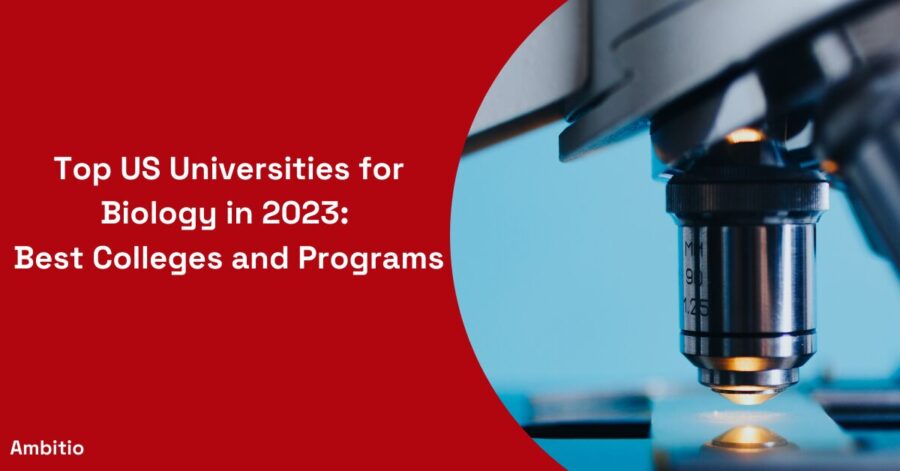20 September 2025
6 minutes read
12 Top US Universities For Masters In Biology For Indian Students

Key Takeaways
- Top US universities for biology demand more than good grades, focusing heavily on research potential, specialization, and real-world impact.
- Only the top 1% of applicants break into leading programs like Harvard, Stanford, and Johns Hopkins, showing the fierce competition at the highest level.
- Mastering the application process with smart university selection, strong research experience, and a sharp SOP can massively boost admission chances.
The toughest part about planning a master’s in biology is realizing that not every big-name university is worth your time or money. You might dream of world-class labs and inspiring professors, but what you often get is overcrowded classrooms and a fancy logo on your CV.
The real value lies in choosing the best biology schools where research is funded, labs are alive, and graduates actually step into biotech or healthcare roles. That’s why this list focuses on universities where the Department of Education rankings align with real outcomes, not marketing gloss.
Why Should You Study Biology In US?
The reality is, the best universities here are playgrounds for the world’s brightest minds. But here’s the catch – those institutions like Harvard University, Stanford University, and Johns Hopkins University aren’t just handing out degrees. They’re looking for students who can push the envelope in top biology research, get involved in life-changing discoveries, and maybe even invent the next miracle drug. Still not convinced? Well, let’s dive into why the U.S. is the ultimate place for your biology journey.
1. World-Class Research Opportunities That You Won’t Find Elsewhere
If you think research in biology is confined to dusty textbooks and lab coats, welcome to the real deal. Harvard, Stanford, and MIT are revolutionizing the field, from genetic engineering at Cambridge to groundbreaking cancer research at Johns Hopkins University. These top biology programs provide access to cutting-edge labs and projects that most other countries just can’t match. It’s not just about getting a degree, it’s about being on the forefront of medical and scientific breakthroughs.
2. Unmatched Networks and Collaboration
In places like Yale University, Cornell, and Northwestern, you’re not just a student, you’re part of a global network of researchers, professors, and industry leaders. Getting admission to a top biology program isn’t just about a shiny diploma; it’s your ticket to connections that can propel your career to international heights. Collaborating with scientists at the University of California or Berkeley could mean being invited to exclusive conferences, securing funding for your research, or landing your dream job at a biotech firm.
3. The Real Deal With Cutting-Edge Technology and Facilities
A biology program at the Massachusetts Institute of Technology means access to labs and technologies that most universities worldwide can only dream of. We’re talking state-of-the-art genetic sequencing, AI-driven research tools, and high-tech bioengineering equipment. You won’t be just observing in a lab, you’ll be actively shaping the future of biology with the best tools on the planet. It’s this commitment to investment that helps make U.S. universities the ultimate breeding grounds for the next big biological breakthrough.
4. Unrivaled Flexibility in Specialization
Studying biology in the U.S. offers the rare opportunity to specialize in exactly what piques your interest. Whether it’s molecular biology at Stanford or environmental science at the University of California, U.S. universities offer diverse tracks. And here’s the kicker: many of these institutions like Berkeley and Harvard University allow students to switch between disciplines as their research interests evolve. The system is designed for students who want to explore beyond a rigid curriculum. It’s freedom with purpose, something that most other countries can’t offer at the same scale.
5. Top-Tier Faculty and Mentorship
When you study at top biology schools like Johns Hopkins or Cambridge, you’re not just getting professors, you’re getting world-renowned experts who are changing the game in biology. At these institutions, you’ll be mentored by professors who aren’t just teaching the subject. They’re living and breathing it in their cutting-edge research. That one-on-one attention can be the difference between getting lost in a classroom and making your mark in the scientific community.
12 Top Universities In US For Masters In Biology
The United States is home to some of the best colleges for biology, offering a blend of rigorous academic programs, exceptional research opportunities, and top-tier faculty. Whether you’re interested in microbiology, biochemistry, or ecology, these universities provide a wealth of knowledge and resources to take your academic journey to the next level.
But let’s be honest, not all schools are created equal, and finding the right fit is key. With so many options to choose from, how do you decide which biological sciences program is the best for your career goals?

Here’s a breakdown of the top universities in the U.S. that offer world-class biology programs.
| University Name | Average Tuition Fees (per year) | Average Salary (Post-Graduation) |
|---|---|---|
| Harvard University | $50,000 | $70,000 |
| Stanford University | $55,000 | $75,000 |
| Massachusetts Institute of Technology (MIT) | $53,000 | $72,000 |
| Princeton University | $52,000 | $68,000 |
| University of California | $45,000 | $65,000 |
| University of Pennsylvania | $48,000 | $70,000 |
| Yale University | $54,000 | $73,000 |
| Johns Hopkins University | $49,000 | $71,000 |
| University of California, Los Angeles | $46,000 | $67,000 |
| University of Chicago | $50,000 | $69,000 |
| Columbia University | $55,000 | $74,000 |
| Cornell University | $47,000 | $66,000 |
What Is The Admission Process Masters In USA?
You’ve got ten layers of essays, interviews, tests, and enough paperwork to make you question your life’s decisions. Applying for a Master’s in the U.S., especially in fields like biological sciences, life science, and biochemistry, isn’t just about hitting “submit.” It’s a full-blown strategy game. Whether you’re targeting top universities like Princeton, UCLA, or the University of Pennsylvania, or eyeing the best colleges for biology on the us news rankings, understanding the real application process is half the battle won.
So, let’s break it down without the sugarcoating.
Step 1: Shortlist the Right Universities
Start by building a college list that matches your academic profile and future career goals. Target a mix of best global universities and strong research universities known for biology programs, ecology, microbiology, and botany. Schools like those located in Cambridge (yes, we mean MIT and Harvard) are heavy hitters, but don’t ignore other gems offering excellent biology and science programs.
Step 2: Crush Standardized Tests (If Required)
While many prestigious universities are test-optional, some still require GRE scores, especially for competitive biology and biochemistry universities. Check each school’s policy because not sending scores when you should, or sending them when you shouldn’t. It can mess up your chances.
Step 3: Perfect Your SOP and Recommendations
Think of your Statement of Purpose (SOP) as your personal Netflix trailer: it needs to be engaging and unforgettable. Highlight your passion for living organisms, your deep dive into different fields like interdisciplinary sciences, and your ambition to contribute to biological sciences. Recommendations? Go for mentors who know your work ethic, preferably those from your college of arts and sciences or your biology major professors.
Step 4: Nail the Application
Each application process varies slightly, but you’ll generally upload your transcripts, resume, statement of purpose, and letters of recommendation through the university’s portal. Pay close attention to each school’s deadlines; missing one could cost you a spot at a top 100 university or your dream ivy program.
Step 5: Show Off Research and Internships
Top biology programs want grad students who bring more than just good grades, they want evidence of real-world experience. Highlight any internship stints, lab work, or research opportunities you seized during your undergrad. Whether it’s pre med programs, pre med schools, or direct research into living systems, experience is pure gold.
Step 6: Prepare for Interviews
Not all schools require them, but if you apply to an ivy league school or a highly ranked biology degree program, you might get called in for an interview. Treat it like a job interview for your future career in life science or biochemistry. Know the academic programs inside out, be ready to talk about your research interests in microbiology or ecology, and show them you’re a fit for their student body size and culture.
Conclusion
It’s competitive, no doubt. But if you’re serious about working with living organisms, pushing the boundaries in biochemistry or ecology, and setting yourself up for real career opportunities, choosing the right universities for biology could change everything.
Take the process seriously, keep your mindset sharp, and treat every step, from your SOP to your interviews, as your personal brand story. The U.S. isn’t just offering you a biology degree, it’s offering you a platform to create something bigger.
To get into a top U.S. university isn’t just about grades, it’s about strategy. Ambitio’s AI-powered platform and expert consultants help you tackle applications, study gaps, and visa approvals with confidence. No confusion, no wasted time, just a clear path to your dream school. So if you want to study in USA, Ambitio is the answer.
FAQs
What is the difference between biology and biochemistry?
Biology is the study of living organisms, while biochemistry focuses on the chemical processes within living organisms.
How do I choose the right biology program for me?
Consider your interests, career goals, and research opportunities offered by universities to find the program that suits you best.
Are there scholarships available for biology students?
Yes, many universities offer scholarships and financial aid to biology students. Check each university’s financial aid office for details.
What can I do with a degree in biology?
A biology degree can lead to careers in research, healthcare, environmental science, education, and more.
Do these universities offer graduate programs in biology?
Yes, most of the universities mentioned in this list offer both undergraduate and graduate programs in biology.

You can study at top universities worldwide!
Get expert tips and tricks to get into top universities with a free expert session.
Book Your Free 30-Minute Session Now! Book a call now




























